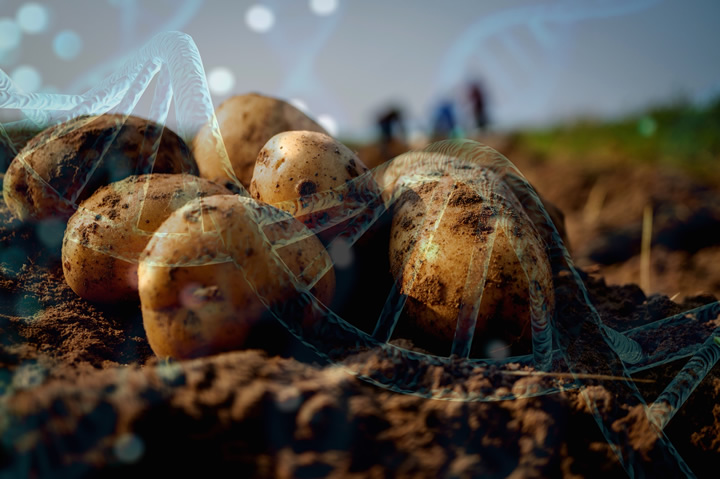REVOLUTIONISING THE UK POTATO INDUSTRY: INNOVATIVE PRECISION BREEDING PROJECT PROMISES RADICAL SOLUTIONS

A UK-based research team is set to step change the potato supply chain by applying cutting edge precision breeding approaches.
Led by B-hive Innovations, the new research project, called TuberGene, is funded as part of UKRI’s National Engineering Biology Programme and aims to harness the power of gene editing to address pressing challenges and secure a sustainable future for the potato industry.
The UK potato sector produces around five million tonnes of potatoes each year but faces significant hurdles, including producing a significant number of potatoes that don’t meet commercial specifications, costing millions of pounds annually. Additionally, changing consumer preferences have caused fresh potato sales to gradually decline, as people opt for quicker-cooking alternatives like rice and pasta.
With new legislation allowing the commercial development of gene edited crops, the project presents an exciting opportunity to transform the industry. Researchers will focus on two key goals: reducing bruising-related discoloration and making potatoes quicker to cook. These improvements aim to enhance potato quality, cut down on food waste, and meet the evolving needs of consumers.
Lincoln-based R&D company B-hive Innovations is a team of agritech and biotech pioneers bringing innovative processes to the fresh produce supply chain, which has attracted significant support as part of UKRI’s funding initiative. Also part of the scientific team delivering the research are Branston Ltd, the James Hutton Institute and James Hutton Ltd.
Dr. Andy Gill, general manager of B-hive Innovations, said: "The UK potato industry is facing significant challenges, and it's crucial that we find innovative solutions to ensure its long-term viability. This project represents a major step forward in our efforts to address issues such as bruising-related losses and changing consumer preferences."
Dr. Rob Hancock, research scientist at the James Hutton Institute, said: "Gene editing and other precision breeding technologies offer unprecedented opportunities to rapidly enhance the traits of potatoes, meeting the need to quickly respond to the changing preferences of consumers. By targeting specific genes responsible for traits like bruising susceptibility and cooking times, we can create varieties that meet the needs of both growers and consumers."
A key part of the project involves sequencing the genome of the Maris Piper potato, a beloved variety in the UK. This foundational work will pave the way for future targeted gene editing to enhance other desirable traits.
Barbara Correia, principal research scientist at B-hive added: “This project leverages the bioinformatics expertise in our business and the genome sequencing allows us to build a pipeline to address other issues in potato farming, such as disease resistance, as we move towards the creation of a Super Spud. It also means that we can apply our skills more easily to other crops, thereby helping more of the UK’s fresh produce sector and safeguarding global food security.”
For more information on the TuberGene project, visit https://www.ukri.org/news/13-5-million-for-48-engineering-biology-rd-projects/
For more information on B-hive, visit https://www.b-hiveinnovations.co.uk/
B-hive Innovations is an agri-tech R&D business based in Lincoln. B-hive develops innovative technologies for fresh produce industry to increase marketable yield, better crop utilisation, adding new value and reducing food waste in the supply chain.
Comments (0)
This post does not have any comments. Be the first to leave a comment below.
Featured Product

